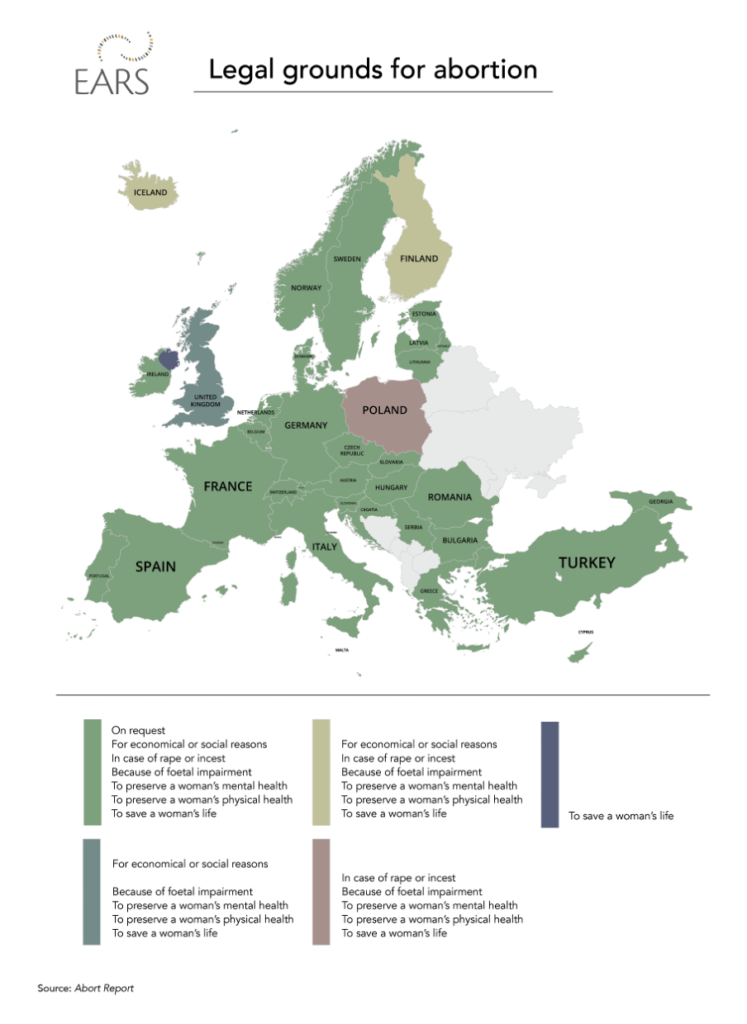Conservative trends in Europe: The case of abortion in Poland
Conservative trends in Europe:
The case of abortion in Poland
In the first of a short series of articles, our analyst Ghila Amati dives into the topic of conservative trends in Europe. This article will explain how the intersection of conservative populism and religion contributed to the passing of a new restrictive law against abortion in Poland.
This article was written by Ghila Amati and reflects her personal analyses and opinions, rather than those of EARS.
Abortion across the globe
According to the data released by Worldometers and based on the World Health Organization statistics,[1] 42.5 million abortions were performed in 2020. As we can see in the map below,[2] abortion is mostly permitted on request in European countries. Yet, there are still some European countries that limit abortion rights, such as Finland, Iceland, and Poland. In countries where abortion on request is allowed, the abortion can be performed no later than 22 weeks since the last menstrual period.[3]

Abortion in Poland
In this article I will mostly focus on the recent events and changes in the laws and attitudes of the Polish government towards abortion. This approach to abortion in Poland is part of a wider phenomenon of conservatism in Eastern European countries. This trend can be partially explained by an increase in populist governments and religiosity in society.
A historical review
Abortion was first legalised in Poland rather early. In 1953, the former Polish communist government permitted the practice of abortion. Yet, in 1989-93, an extensive abortion debate was started in Poland and the Catholic Church led an aggressive campaign to make abortion illegal. At the time, abortion had in fact become a means for birth control as the state did not support birth control and family planning.[4] Finally, in 1993, abortion was made illigal mainly as a result of the Church campaign inspired by the Polish pope Johannes II (Wojtyla). From then on, abortion was allowed in Poland only in cases of irreversible impairment to the fetus, severe danger to the life or well-being of the mother, or when pregnancy came as a result of rape or incest.[5] [6]
Abortion in Poland today
The debate over abortion in Poland was re-opened recently, when in October 2020, the Polish Constitutional Tribunal ruled that abortion in the case of serious fetal impairment is not compatible with the Polish Constitution.[7] According to this ruling, abortion will only be allowed in Poland in cases of rape or incest, or if there is danger to the health and the life of the mother. The ruling came as a result of a motion filed to the tribunal by the governing right-wing Law and Justice party (PiS). It is important to remember that even before this ruling, Poland was one of the strictest countries in Europe in terms of abortion policy. According to the BBC, this already caused around 200,000 Poles every year to travel outside Poland to undergo abortions or seek unlawful and dangerous procedures.[8]
This new ruling caused an explosion of protests in Poland, in one of the biggest demonstrations Poland has seen in forty years.[9] [10] The last march of this size was seen in the 1980s and led to the fall of the government.[11] On January 27, 2021 – despite these protests – the new law against abortion passed.[12] Who was responsible for this policy? What forces brought about this change?
The Catholic Church hypothesis
Is the Church involved in the toughening of the abortion policy? Poland is a Catholic-majority state and – as many other Catholic states such as Malta and Northern Ireland – it has traditionally upheld restrictive abortion laws.[13] As I noted above, the Catholic Church had a major role in the law that was passed in 1993 that restricted abortion rights for women. Moreover, in the 2000s, the Church threatened the Polish government that it would no longer support Poland’s entrance into the EU if the existing abortion laws would be modified.[14] In this sense, it is impossible to deny a link between family planning laws and Catholicism in Poland. In April 2016, the Polish Episcopate published a public letter asking for the harshening of limitations on abortion in Poland.[15] Currently, the same protesters against the new ruling are accusing the Church’s enduring involvement in political life of being responsible for the new abortion restrictions.[16]
As a consequence, activists – for the first time in Poland’s history – are disrupting services in churches across the country.[17] Moreover, women, in a sign of protest, are dressing up as handmaids in reference to Margaret Atwood’s novel the Handmaid’s Tale, which portrays a society based on the religious repression of women. These protests are a first sign of discontent among young Poles of the excessive authority the Catholic Church assumes in political matters.[18]
The populist hypothesis
Is populism also responsible for the new ruling? Even though the connection seems less straightforward, it appears that populist influence also applies to this decision.
According to journalist Gloria Trifonova, the Law and Justice national conservative[19] and populist ruling party in Poland (PiS) held both anti-scientific and anti-expert positions in its policy making. This new restriction against abortion – together with other restrictions already in place in Poland regarding IVF treatment and the morning-after pill – diminishes the place of science and developed medicine in family planning decisions.[20] Another populist aspect is represented by the fact that the PiS party argues for the significance of traditional Catholic values for the endurance of the Polish society. Traditional Catholic values are not compatible with technological developments concerning reproduction.[21] [22] Moreover, according to Trifonova, “the dichotomy of the ‘people,’ majority Polish Catholics, versus the ‘others,’ mainly marginalised groups, becomes the raison d’etre for policy making.” That is, the main reason certain policies exist is to sustain the dichotomy between the Catholic majority and the marginalised groups.[23]
The spreading of COVID-19, and the failure of the Polish government to respond properly to this crisis, may also be responsible for the populist decision to even further restrict the abortion laws in Poland. According to historian and political editor Karolina Wigura, “one of the standard tricks of the COVID-19-era illiberal populist is to reach for religion when you are being accused of incompetence.” The leader of the PiS, Kaczyński, is – according to Wigura – using the new anti-abortion law as a means to keep the government coalition together in this difficult time and to demote his competing party – the Confederation. Moreover, the law is a way to “thank the church for its support in recent years,” according to Wigura.[24]
Populism, the Catholic Church, and conservative trends
It appears very difficult to determine whether this conservative new ruling results simply from a populist policy or from Catholic religious pressure. These two aspects are definitely interconnected in Poland, where we can witness new conservative trends. Populist governments regularly employ religious values to create cohesion in already conservative and religious nations, while the Church seems to often enjoy the fruits of these policies.[25] In my next weekly comment, I will analyse conservative trends in another European country: Hungary. Similar to the case in Poland, I will analyse how populism, Catholicism, and conservative trends all intersect in Hungary’s family politics.
This article was written by Ghila Amati and reflects her personal analyses and opinions, rather than those of EARS.
Interested in similar topics? Go to our Dashboard and receive free updates.
[1] Worldometer – real time world statistics
[2] EUROPEAN DATA – ABORT report
[3] EUROPEAN DATA – ABORT report
[4] Abortion Policy in Postcommunist Europe: The Conflict in Poland by Andrzej Kulczycki
[6] Anti-Abortion Law Reimposed in Poland
[7] Abortion due to foetal defects unconstitutional in Poland
[8] Why Poland’s New Abortion Law Is Causing Mass Protests
[9] Poland’s biggest protests in decades stand against abortion ban
[10] Why Poland’s New Abortion Law Is Causing Mass Protests
[11] https://edition.cnn.com/2020/10/31/europe/poland-abortion-protests-scli-intl/index.html
[12] Fresh protests in Poland as near-total abortion ban comes into force
[13] Poland: New Restrictions on Abortion – Catholic Influence or a Populist Agenda?
[14] Poland: New Restrictions on Abortion – Catholic Influence or a Populist Agenda?
[15] Women, Populism and Protests in Poland – Australian Institute of International Affairs
[16] Poland: New Restrictions on Abortion – Catholic Influence or a Populist Agenda?
[17] Polish women disrupt church services in protest at abortion ban
[18] Poland: New Restrictions on Abortion – Catholic Influence or a Populist Agenda?
[19] Populist Parties in Europe: Agents of Discontent? by Stijn van Kessel
[20] Poland: New Restrictions on Abortion – Catholic Influence or a Populist Agenda?
[22] Poland: New Restrictions on Abortion – Catholic Influence or a Populist Agenda?
[23] Poland: New Restrictions on Abortion – Catholic Influence or a Populist Agenda?
[24] Poland’s abortion ban is a cynical attempt to exploit religion by a failing leader | Karolina Wigura






